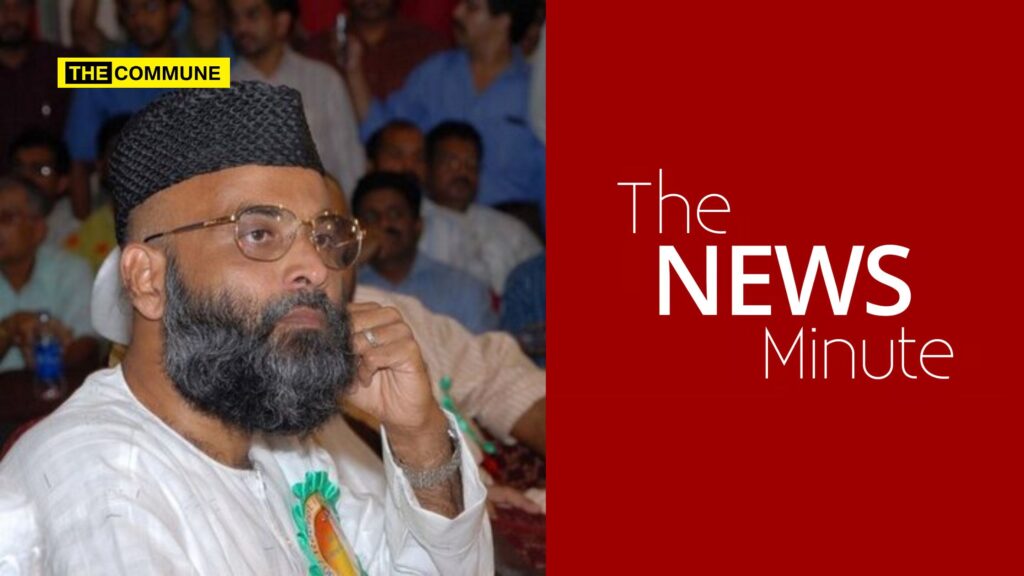In an egregious display of journalistic irresponsibility, The News Minute (TNM) has published a highly problematic piece glorifying Abdul Nasir Maudany, a man charged in two heinous bomb blast cases, including the 1998 Coimbatore blasts that claimed 58 lives and injured over 200. Instead of providing a balanced account of a deeply controversial figure, TNM’s article reads like a fawning hagiography, dangerously whitewashing terrorist Maudany’s divisive legacy and downplaying his alleged involvement in acts of terror.
This is not just a failure of journalism—it is an affront to the victims of terrorism and a betrayal of the public trust. By selectively presenting a narrative of Maudany’s “forgiveness” and “advocacy for the oppressed,” TNM undermines the gravity of his alleged crimes and paints a dangerously misleading portrait of a terrorist.
Forgiveness Framed As Virtue, Ignoring The Larger Picture
TNM glorifies Maudany’s supposed magnanimity, highlighting his forgiveness of RSS workers accused of a 1992 bomb attack that cost him his leg: “Despite this, he publicly forgave the culprits and even appeared in court at the beginning of the trial, requesting a pardon for the accused.”
While this may appear noble, it is an oversimplification of a much more complex and troubling legacy. TNM conveniently ignores Maudany’s long history of inflammatory speeches, which stoked communal tensions and contributed to an atmosphere of division and hostility in Kerala. Forgiveness does not absolve him of his role in deepening societal fractures or the allegations that link him to acts of terror.
Dangerous Romanticization Of A Polarizing Politician
TNM attempts to reframe Maudany as an advocate for social justice: “On April 14, 1993, Ambedkar’s birthday, Maudany founded the PDP, calling for unity among Dalits, Muslims, and other backward communities.”
This description blatantly ignores the People’s Democratic Party’s (PDP) reliance on communal identity politics. Far from being a unifier, Maudany’s political rhetoric often deepened divides along religious lines, fostering mistrust and resentment. TNM’s portrayal sanitizes this reality, reducing his divisive politics to an idealized mission for justice.
Exploiting Tragedy To Build A Narrative
The article highlights Maudany’s reaction to the tragic death of Sirajunnisa, an 11-year-old girl, as a turning point in his life: “Sirajunnisa’s murder profoundly affected Maudany, becoming a personal mission for him. He used the incident as a poignant example of the oppression faced by his community.”
What TNM fails to mention is how Maudany’s rhetoric frequently exploited such tragedies to fuel communal grievances and rally political support. While he claimed to fight for justice, his actions often exacerbated tensions rather than healing them.
A Token Apology For Inflammatory Rhetoric
TNM attempts to downplay Maudany’s history of incendiary remarks by citing his later apology: “He later apologised for these comments, acknowledging the damage they may have caused.”
This superficial acknowledgment cannot undo the harm caused by his earlier words. Statements like “Muslim boys are born seeing blood” did not just inflame passions; they left lasting scars on Kerala’s social fabric. An apology years later does little to mitigate the consequences of such divisive rhetoric.
Selective Storytelling And Omission Of Victim Voices
The article quotes glowing testimonials about Maudany’s character: “Swami Saraswatheekananda and Maudany were great friends. … He spoke very strongly for his community and I don’t find anything wrong about that.”
However, there is a glaring absence of perspectives from the victims and survivors of the Coimbatore and Bengaluru blasts. TNM’s deliberate focus on Maudany’s personal anecdotes and friendships erases the pain of those who suffered in the attacks he stands accused of orchestrating or abetting.
Misrepresenting Legal Proceedings
TNM leans heavily on the fact that Maudany has not been convicted, portraying him as a victim of judicial delays. While prolonged trials are indeed a failure of India’s legal system, they do not exonerate him. Maudany’s status as an undertrial does not absolve him of the grave charges he faces, nor does it warrant the kind of uncritical sympathy TNM extends.
Irresponsible Journalism As Propaganda
By selectively highlighting Maudany’s “forgiveness” and “advocacy,” TNM crafts a narrative that dangerously flirts with absolution. This is not journalism—it is propaganda disguised as storytelling. The piece not only distorts the facts but also normalizes extremist behavior by portraying Maudany as a misunderstood anti-hero.
The Betrayal Of Victims And Public Trust
Terrorism is not an abstract issue; it is a grave and immediate threat that destroys lives and destabilizes societies. In choosing to humanize a terror-accused figure while ignoring the voices of his victims, TNM has abdicated its responsibility to report with fairness and rigor. This is a betrayal not only of journalism’s core principles but also of the countless victims of communal violence.
Stop The Whitewashing
The News Minute must be held accountable for this reckless glorification of a deeply controversial figure. Journalism has the power to inform, educate, and uphold justice—but when it is wielded irresponsibly, it can cause irreparable harm. TNM’s attempt to rewrite Maudany’s legacy is not just poor journalism—it is an insult to the victims and a dangerous distortion of history.
Maudany is no saint, and it is high time media outlets stopped portraying him as one.
Subscribe to our channels on Telegram, WhatsApp, and Instagram and get the best stories of the day delivered to you personally.

